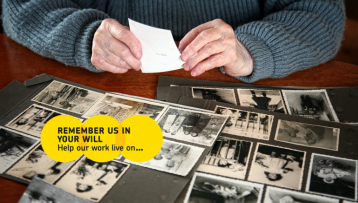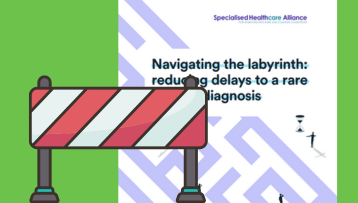This article was originally published in an issue of our community magazine, Scan.
There are an estimated 13.6 million unpaid carers in the UK, including many people in the TSC community who care for a loved one who lives with TSC. Being a carer for a loved one can often be an emotionally draining and exhausting challenge, leaving whole family units overwhelmed. If you care for someone who lives with TSC, it’s important to remember to also care for yourself.
A recent Carers UK survey highlighted the impact that caring can have on the wellbeing of carers: 1 in 3 carers said that they had suffered mental ill health as a result of caring, 3 in 5 carers confirmed physical ill health due to being a carer, and 8 in 10 carers said that they felt lonely or socially isolated.
It is common for carers of loved ones to find themselves so invested in their caring responsibilities that they have little or no ability to think or act upon anything else. This is understandable, as putting all of our energy and time towards supporting people we care about is often placed as a priority above our own wellbeing. But, self-care is also vital.
Self-care for carers helps to create meaningful and fulfilling lives, even during the most challenging of times. Carer burnout is not uncommon, and often only a natural reaction to the impact of caring. Taking even a very small amount of time to act upon your own social and emotional wellbeing can have many positive
impacts, and is not selfish but rather a necessity to recharge your batteries, so that you can best care for your loved ones.
Here are some tips on how you can continue in your caring role while maintaining your own emotional resilience:
1. Acknowledge and talk about your own feelings
Guilt, anger and depression are just some of the common emotions that we can experience when caring for someone becomes too much. It is normal to feel that you are not coping at times – these feelings should not be ignored, but instead acknowledged. By being consciously aware of these negative emotions, you can come to terms with them and move forward in a way that is constructive and focused on acceptance. A recent TSA virtual session by Dr Jennifer Black (Clinical Psychologist, Bristol Royal Hospital for Children), discussed this through Acceptance and Commitment Therapy (ACT). You can watch the session here. It can also help to talk about your feelings with someone, whether a family member, another loved one, or even the TSA Support Line (0808 801 0700 / support@tuberous-sclerosis.org).
2. Ask for help
This can be an incredibly difficult step for carers to take, but asking for help can sometimes make all the difference. Whether it is financial, emotional or physical support, speaking to someone who may be able to help your situation could open up opportunities you had not considered previously. At the very least, telling an employer, GP, or the council can help to start a conversation about support for you as a carer.
3. Get some respite, even five minutes
Finding time for yourself might not always be possible, but ideally a schedule of regular respite breaks can be a big help. Whether it’s a full day or even just five minutes, taking some time for yourself can help to ‘refuel your carer tank’. You might be able to access respite care through your local authority.
Even if you don’t think that council respite care would be suitable for you, it can sometimes be still worth having an initial chat with them.
4. Healthy living
A balanced diet and regular exercise affect how we feel physically and mentally. It can be difficult as a carer, but even a quick walk in the park, or grabbing some fresh fruit rather than a sugary snack, can have big benefits. By living a healthier lifestyle, you might find that your energy levels and mood also pick-up, helping you to help yourself more and more.
5. Take steps for better care
Everyone feels better after a good sleep, and often much worse following a night of unrest. It might not be possible depending on your personal circumstances and the circumstances of your family, but taking steps to getting better sleep might benefit to you. Even a power nap during the day can be energy boosting, and help you to feel better and care for your loved one. Over the last 18 months we have hosted two sleep-focused virtual sessions. You can watch them in full here.
Being a carer in the TSC community can sometimes be extremely lonely and isolating, but remember that the TSA is here for you, as is the wider TSC community who understand the impact of TSC on daily life. Get in contact with the TSA Support Line, or join in the conversation on our Facebook page.
Make a one off or regular donation
£10 Can allow us to send a welcome pack to a family who has just received a life-changing TSC diagnosis, ensuring that they do not go through this time alone.
£25 Can help us develop materials that are included in our support services, flagship events or campaigns.
£50 Can provide laboratory equipment for a day’s research into the causes, symptoms, management or treatment of TSC.
To provide help for today and a cure for tomorrow



























































































































